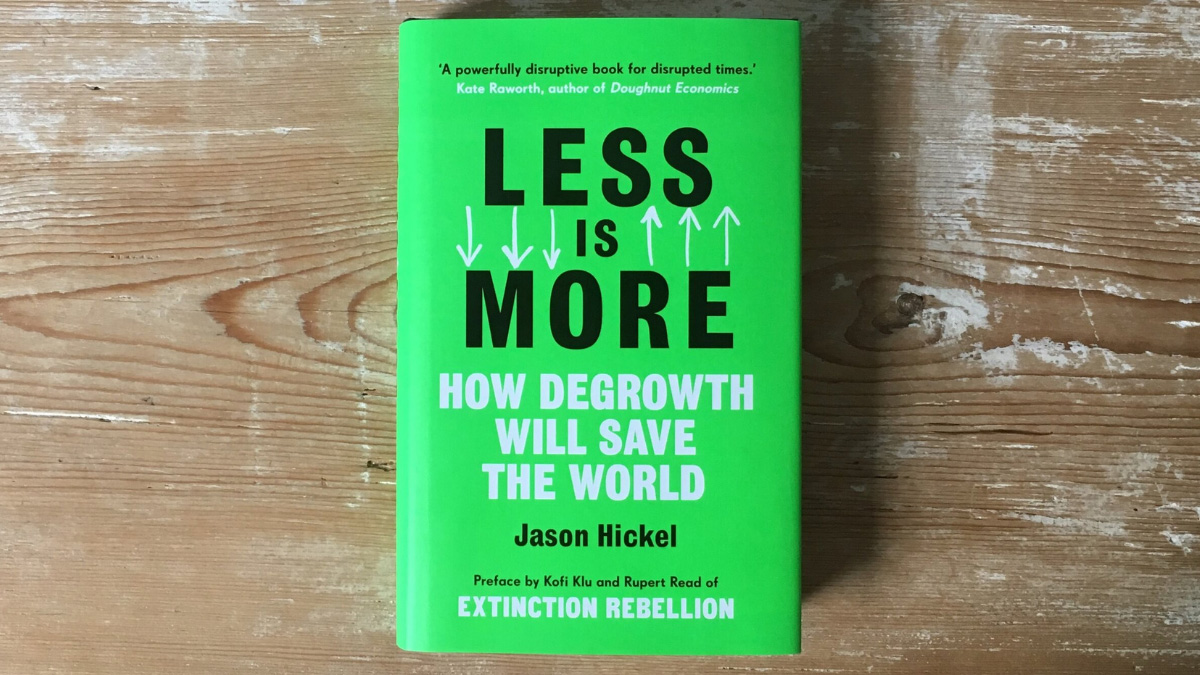 ‘Less is more – How degrowth will save the world’ ‘Less is more – How degrowth will save the world’ is a book by Jason Hickel: an economic anthropologist, Fullbright Scholar and Fellow of the Royal Society of Arts.
‘Less is more – How degrowth will save the world’ ‘Less is more – How degrowth will save the world’ is a book by Jason Hickel: an economic anthropologist, Fullbright Scholar and Fellow of the Royal Society of Arts.
The book begins with how human activity has degraded the world we live in. Without action, the planet is on a path to becoming uninhabitable. It talks in detail about the evolution of capitalism - beginning as Feudalism ended, which coincided with the start of ‘enclosure’ – creating a world assessed solely on what is produced, and later Gross Domestic Product, with no consideration for welfare or the planet.
Participants felt there was little to be optimistic about in the opening chapters. The author paints a bleak image with well-poised facts which pre-empt typical counter-argument. That is until Chapter 5, when solutions are proposed, which ultimately advocate the concept of ‘degrowth’ as a solution to the current climate and ecological crises.
The book draws out a great irony behind the claim of “green growth”. Our path of endless growth means any additional renewable energy investment is simply used to cater to additional demand. The book provides evidenced-based arguments against the current model of capitalism - this led to interest amongst participants to find out more about alternative models.
“If we continue to grow the economy at the projected rates, it will more than double in size by the middle of the century – that’s twice as much extraction and production and consumption than we are presently doing.”
A topic discussed at length in the book is the lasting impact of colonialism and capitalism, portraying the inherent need for justice in any future economic model. This was especially poignant with the recent outcomes of COP26 showing the stark divide between the global north and south.
The book presents a detailed history of capitalism and how it has shaped the world we live in today. Degrowth would require a rethink on our current economic models. Participants reflected that in the UK at least, pupils are not taught any alternative economic models to those which promote GDP growth. The book also presents growing evidence against the theory of “trickle-down” economics – emphasising widening inequality between the rich and poor.
The book also celebrates countries that have lower GDPs yet have higher levels of human development than countries such as the US. This put the readers in touch with an alternative viewpoint on these metrics.
The degree to which the world justifiably relies on technology was made no clearer with the revelation that, until 2018, the International Panel of Climate Change (IPCC) allowed for negative emission technology in 101 of their 116 scenarios. These were the same scenarios documented in 2014’s “Fifth Assessment Report”. One participant likened this to the film ‘Don’t Look Up’, where [spoiler alert] the US Government attempts to catch a meteor that is heading towards earth - using unproven technology - to harvest the minerals.
We may not always need new technology to improve society. During the pandemic, office workers were able to make use of what they already had to work from home which, as well as reducing emissions associated with commuting, some believe has improved their work-life balance.
Reliance on technology as a one-stop solution for the climate crisis is an unrealistic expectation. However, the consensus was that it does have a role to play, be it in a degrowth or green growth system.
Hydrogen provides the possibility of producing clean energy, limitlessly. But, even in such a reality, it does not solve other issues such as biodiversity loss, land conversion, chemical pollution, resource extraction, and so on, thus negating the green aspect of the theory.
How does the idea of de-growth sound to you? As a concept, does it have positive connotations? Some felt the word may come across as controversial, particularly if you don’t read into its deeper meaning. It was discussed whether there are other ways of phrasing the same concept. For example, to move towards an appreciation of things for their use-value, rather than their exchange-value.
“Degrowth stands for de-colonisation, of both lands and people and even our minds. It stands for the de-enclosure of commons, the de-commodification of public goods, and the de-intensification of work and life. It stands for the de-thingification of humans and nature, and the de-escalation of ecological crisis. Degrowth begins as a process of taking less. But in the end, it opens up whole vistas of possibility. It moves us from scarcity to abundance, from extraction to regeneration, from dominion to reciprocity, and from loneliness and separation to connection with a world that’s fizzing with life.”